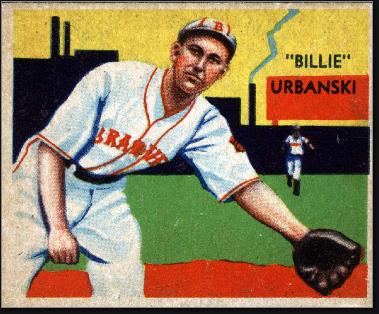
Sport: Baseball
Born: June 5, 1903
Died: July 12, 1973
Town: Perth Amboy, New Jersey
William Michael Urbanski was born June 5, 1903 in Linoleumville, New York, a company town on the western edge of Staten Island, and grew up in Perth Amboy, NJ. Quick and coordinated but a bit undersized, Billy learned the game in the waning years of the Dead Ball era, when his slick fielding and slap-hitting were highly valued. He never graduated from high school, opting instead to attend a barber college in New York.
Billy excelled in semipro and sandlot ball in New Jersey, and signed his first pro contract in 1925 with the Jersey City Skeeters of the International League. The Skeeters asked him to shorten his name to Urban, but Billy declined, saying it might hurt his father’s feelings. Even after becoming a professional player, Billy continued to work in his hometown as a barber—an interesting job for someone who was nearly bald by his mid-20s.
Billy sharpened his game over the next five seasons, hoping to catch the eye of a big-league club. He played at the highest level of the minors, taking the field for the Baltimore Orioles and Montreal Royals. Billy was batting .331 for the Royals midway through the 1931 season when his contract was purchased for $30,000 by the Boston Braves. He took over for rookie Bill Dreesen as the team’s everyday third baseman, playing beside the legendary Rabbit Maranville. Billy hit .238 in 82 games for the seventh-place Braves.
The following season, manager Bill McKechnie moved Rabbit to second and installed Billy at short. He was one of the top defenders in the league and batted .272 in the two-hole behind Maranville. The Braves finished 77–77, 13 wins better than the year before.
Billy remained Boston’s regular shortstop through the 1936 season. His best year at the plate was 1934, when he batted .293 and was among the league leaders with 104 runs scored. In a June game against the Phillies, he had 6 plate appearances without being charged with an official at bat. Billy drew four walks and had two sacrifice bunts. By this time he was regarded as one of the best bunters in the NL.
Billy attended the 1934 All-Star game as a possible replacement for Travis Jackson of the Giants, who was dealing with an eye infection. Jackson played, so Billy never was added to the roster. The Braves finished in fourth place in 1934; the next time they finished higher was in 1947.
In 1935, the Braves had a new drawing card in Babe Ruth, but little in the way of overall talent. They plummeted to 38–115, one of the worst records of the era. The 1936 season was Billy’s final one in Boston. The Braves were renamed the Bees that year. Early in 1937, the Bees traded Billy to the Giants for Tommy Thevenow. Billy never suited up for New York. He played in the minors for three seasons—including one as player-manager of the Class-C Youngstown Browns in 1939—before retiring to Perth Amboy.
Billy got into the insurance business and ran an agency for many years. He gave out souvenir wooden pens shaped like baseball bats with his autograph. Billy passed away in 1973 at the age of 70.